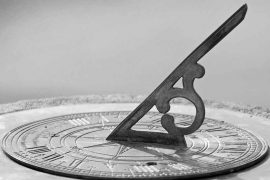Was mathematics invented or discovered?
(I’ll give you a second or two to really think about that.)
Most non-mathematicians have never really given that question much thought. Math has just always been there. An isosceles triangle has always had two congruent sides, and 3 + 8 has always equalled 11. But the reality is this: since the beginning time, human kind has struggled to find ways to describe its world. And one important outcome of this struggle is what I call the language of mathematics. Whether math was invented or discovered, the people involved were fascinating and scary and funny and sometimes sad. And that’s why I’ve decided to devote the remainder of November to the history of mathematics. Here are a few of the stories I hope to share with you.
1. There was the 1st Century Roman who, while taking a bath, figured out the idea of displacement. What did he do? Well, naturally, he shouted “Eureka!” and went running down the streets in his birthday suit. (Or so the story goes.)
2. Then there was the 5th century, mystical cult that demanded complete loyal and secrecy from its members. And by the way one of its members discovered one of the most useful and important facts about right triangles.
3. In the 1600s, the surrogates of two mathematicians — one in England and the other in Germany — held heated debates over who had actually invented (or discovered) calculus.
4. A child prodigy born in 1777 was confounding his teachers and managing his father’s business accounts at the tender age of five. He went on to make a staggering number of contributions in number theory, statistics and algebra, including normal distribution and the bell curve. He also apparently chose work over being at his wife’s deathbed, saying, “Ask her to wait a moment; I’m almost done.”
5. A girl (gasp!) made significant contributions to the fields of abstract algebra and physics in 19th and 20th century Germany.
6. After cracking World War II German codes for the Brits and playing a major role in the birth of computer science, one fellow was arrested for the crime of homosexuality, chose chemical castration over prison and is said to have killed himself by cyanide poisoning at the age of 42.
Clearly, the history of mathematics is full of comedy and tragedy. The stories weave in and out of major world developments and the histories of other sciences. At the least, some of these stories are entertaining. Others help us make connections between ideas that lead to our own personal revelations. Still others remind us that while these contributions have provided the underpinning of how we understand our world today, the people behind them were just that — people.
So climb aboard this mathematical time machine. I’m still trying to decide whether to take it chronologically or by subject or perhaps even with a more random approach. Let’s just see what happens, shall we?
Do you have a question about the history of mathematics? If so, please share it in the comments section. I’m happy to take suggestions of topics I should consider.
